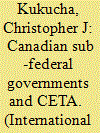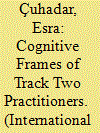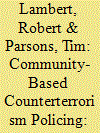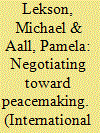|
|
|
Sort Order |
|
|
|
Items / Page
|
|
|
|
|
|
|
| Srl | Item |
| 1 |
ID:
124723


|
|
|
|
|
| Publication |
2013.
|
| Summary/Abstract |
Canadian provinces and territories have gained increasing relevance in matters of international trade over the last several decades. The possibility of a Canada-European Union Comprehensive Economic and Trade Agreement, however, marks the first time that sub-federal governments in Canada have been directly involved in specific areas of negotiations. The significance of this development, examined in this series of policy papers, can be organized under five overarching themes: 1) the negotiation, ratification, and implementation of foreign trade agreements; 2) the need to distinguish between process activity and actual policy outcomes; 3) the ongoing relevance of Canadian federalism; 4) the impact of non-governmental actors, especially civil society; and 5) the differing interpretations of academics, practitioners, business, and societal groups.
|
|
|
|
|
|
|
|
|
|
|
|
|
|
|
|
| 2 |
ID:
176506


|
|
|
|
|
| Summary/Abstract |
This article explores the extent to which framing affects Track Two diplomacy practice and especially how the cognitive frames used by practitioners shape the design of their interventions. The framing effect is pervasive and shapes every type of action. Peacebuilding and Track Two work are no exception. Track Two practitioners often rely on frames as cognitive heuristics when they design their interventions. This article reports on the results of an online survey of 273 participants, using measures based on categories identified in two previous qualitative studies using the grounded theory approach. Four main frames used by practitioners are presented, along with examples from practice: psychologists, constructivists, capacity-builders, and realistic negotiators. Finally, the implications of being captive to the framing effect for Track Two practice are discussed. Steps are suggested towards making more deliberative and reflective context-specific decisions about interventions rather than “fast thinking” based on heuristics and bias.
|
|
|
|
|
|
|
|
|
|
|
|
|
|
|
|
| 3 |
ID:
156624


|
|
|
|
|
| Summary/Abstract |
This article presents recommendations for practitioners of community-based counterterrorism policing. The recommendations are located and explained within two broad propositions: recognize the implications and limitations of policing by consent, and respect the legitimate religious beliefs of all communities. Highlighting tensions between high and low policing and between policing and government imperatives, the article helps illustrate how different aspects of counterterrorism policy and practice may sometimes be at odds with one another. The recommendations are aimed at recognizing and, where practicable, reconciling such tensions. They arise from the authors' engagement with the issues in London and are understood to have application in other towns and cities in the United Kingdom and the West, particularly in communities and neighborhoods where Muslim citizens are the principal recipients of this form of policing.
|
|
|
|
|
|
|
|
|
|
|
|
|
|
|
|
| 4 |
ID:
098447


|
|
|
|
|
| Publication |
2010.
|
| Summary/Abstract |
This article outlines the approach of the United States Institute of Peace (USIP) to training in negotiation and associated skills. USIP has provided such training for over a decade to a wide array of international practitioners, both those who are in some way directly engaged in, or at least affected by, a conflict, and international third parties from outside the conflict zone. USIP concentrates in its negotiation training on building an understanding of the negotiating environment as well as on building specific negotiation strategies. In addition to skill-building, the training programs focus on developing an understanding of the nature and dynamics of conflict and of the overlapping and interlocking nature of actors, issues, and interests in a conflict situation. The article points out five elements of content that must be included to ensure a successful program, providing illustrative examples from actual workshops. These elements include helping participants to establish effective relationships with negotiating counterparts; presenting basic concepts; acquiring and improving skills; practicing through simulations; and working together on how best to apply these skills to the real world conflicts with which they are dealing. The two case studies describe training programs for Serbian and Albanian leaders in Kosovo, and for Iraqi civil servants.
|
|
|
|
|
|
|
|
|
|
|
|
|
|
|
|
|
|
|
|
|